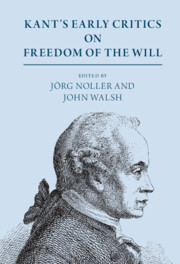Book contents
- Kant’s Early Critics on Freedom of the Will
- Kant’s Early Critics on Freedom of the Will
- Copyright page
- Contents
- Acknowledgements
- Note on the Edition and Translation
- Chronology of the Translated Texts and Kant’s Major Works
- Abbreviations
- Historical and Systematic Introduction
- I Freedom and Determinism
- II Freedom and Imputability
- III Freedom and Consciousness
- IV Freedom and Skepticism
- V Freedom and Choice
- Immanuel Kant, Preliminary Notes and Reflections to the Introduction to the Metaphysics of Morals, Before 1797
- Immanuel Kant, Introduction to the Metaphysics of Morals, 1797
- Karl Leonhard Reinhold, “Some Remarks on the Concept of the Freedom of the Will, Posed by I. Kant in the Introduction to the Metaphysical Foundations of the Doctrine of Right,” in Auswahl vermischter Schriften, Volume ii, Jena, 1797, 364–400
- Friedrich Wilhelm Joseph Schelling, “General Overview of the Most Recent Philosophical Literature,” Philosophisches Journal 7(2) (Jena and Leipzig, 1797), 105–186
- Appendix: Biographical Sketches
- Glossary
- Notes
- Bibliography
- Index of Persons
- Index of Subjects
Immanuel Kant, Preliminary Notes and Reflections to the Introduction to the Metaphysics of Morals, Before 1797
from V - Freedom and Choice
Published online by Cambridge University Press: 24 March 2022
- Kant’s Early Critics on Freedom of the Will
- Kant’s Early Critics on Freedom of the Will
- Copyright page
- Contents
- Acknowledgements
- Note on the Edition and Translation
- Chronology of the Translated Texts and Kant’s Major Works
- Abbreviations
- Historical and Systematic Introduction
- I Freedom and Determinism
- II Freedom and Imputability
- III Freedom and Consciousness
- IV Freedom and Skepticism
- V Freedom and Choice
- Immanuel Kant, Preliminary Notes and Reflections to the Introduction to the Metaphysics of Morals, Before 1797
- Immanuel Kant, Introduction to the Metaphysics of Morals, 1797
- Karl Leonhard Reinhold, “Some Remarks on the Concept of the Freedom of the Will, Posed by I. Kant in the Introduction to the Metaphysical Foundations of the Doctrine of Right,” in Auswahl vermischter Schriften, Volume ii, Jena, 1797, 364–400
- Friedrich Wilhelm Joseph Schelling, “General Overview of the Most Recent Philosophical Literature,” Philosophisches Journal 7(2) (Jena and Leipzig, 1797), 105–186
- Appendix: Biographical Sketches
- Glossary
- Notes
- Bibliography
- Index of Persons
- Index of Subjects
Summary
Kant’s preliminary notes for the Introduction to the Metaphysical Foundations of the Doctrine of Right offer insight into his claims in the published text and his attempt to differentiate the legislative and executive moments of volition. In these notes Kant addresses the distinction between the will and the power of choice as well as the definition and scope of freedom of the power of choice. However, rather than settle the question of whether the capacity to choose to transgress the moral law belongs to freedom of the will, several of Kant’s statements seem to contradict. On the one hand, he claims that the free power of choice can be determined only by the law of the subject’s own causality and that there is no unlawful volition. On the other hand, he asserts that the power of choice is free to observe or transgress the law’s command. While Kant claims that only the power of choice, not the will, can be considered free, he also states that the will is free in another sense insofar as it is lawgiving. The context of these apparently conflicting claims suggest a nuanced account of freedom of the will and offer material for further scholarship.
- Type
- Chapter
- Information
- Kant's Early Critics on Freedom of the Will , pp. 229 - 231Publisher: Cambridge University PressPrint publication year: 2022



